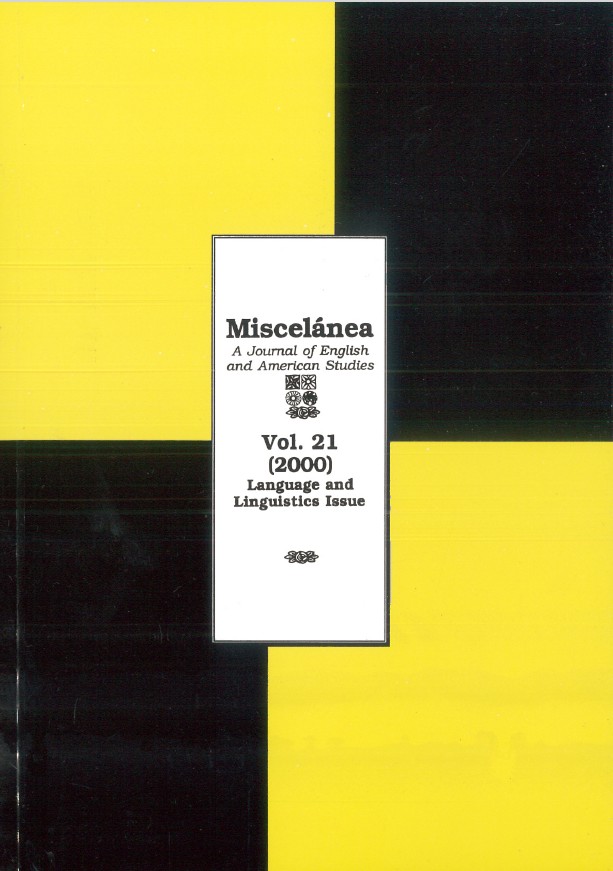The Use of Pragmatic Politeness Theory in the Interpretation of Hemingway's "Hills like White Elephants"
DOI:
https://doi.org/10.26754/ojs_misc/mj.200011005Keywords:
pragmatic politeness, fictional dialogue, interpretation, gender, negotiationAbstract
In the interpretation of a literary text, specially if the information granted by the author is insufficient, reinterpretation by means of inferences is necessary. The reader's previous background knowledge will often position him/ her in his/ her interpretation and so the text is open to subjective rendering. I we accept that literary dialogue is another form of social communication, Pragmatic Theory can be of help when it comes to studying texts like “Hills like White Elephants”, where the words uttered by the characters hold the key to the meaning of the story. In this article, I will mainly use Brown and Levinson's politeness theory to analyze the strategies used by the two interactants in an attempt to-sketch a profile of the motivations underlying their linguistic behaviour and to provide a less arbitrary interpretation of the text.
Display downloads
References
ANDERSON, R. C. et al. 1977. “Frameworks for Comprehending Discourse”, American Educational Research Journal 14: 367-381. DOI: https://doi.org/10.3102/00028312014004367
BROWN, G. and G. YULE. 1983. Discourse Analysis. Cambridge: Cambridge U. P. DOI: https://doi.org/10.1017/CBO9780511805226
BROWN, P. and S. C. LEVINSON. 1987. Politeness: Some Universals in Language Use. Cambridge: Cambridge. U. P. DOI: https://doi.org/10.1017/CBO9780511813085
BURTON, D. 1980. Dialogue and Discourse. A Sociolinguistic Approach to Modern Drama Dialogue and Naturally Occurring Conversation. London: Routledge & Kegan Paul.
COULTHARD, M. 1987. An Introduction to Discourse Analysis. New York: Longman.
ECO, U. 1987. Lector en Fabula: la Cooperación interpretativa en el texto narrativo. Barcelona: Lumen.
ELAM, K. 1980. The Semiotics of Theater and Drama. London: Methuen. DOI: https://doi.org/10.4324/9780203993309
FAIRCLOUGH, N. 1991. Language and Power. London: Longman.
GOFFMAN, E. 1967. Interaction Ritual: Essays on Face to Face Behavior. New York: Garden City.
GUILLÉN NIETO, V. 1998. “Pragmatics and Dramatic Discourse: the Power of the Unsaid”. In Vázquez, I and I. Guillén. (eds.). Perspectivas pragmáticas en lingüística aplicada. Zaragoza: Anubar Ediciones: 49-54.
HAAS, A. 1979. “Male and Female Spoken Language Differences”. Psychological Bulletin 86 (3): 616-626. DOI: https://doi.org/10.1037//0033-2909.86.3.616
HAYS, R. B. 1984. “The Development and Maintenance of Friendship”. Journal of Social and Personal Relationships 1: 75-98. DOI: https://doi.org/10.1177/0265407584011005
HEMINGWAY, E. (1935) 1987. “Hills like White Elephants”. In The Complete Short Stories of Ernest Hemingway. New York: Macmillan: 211-214.
HERMAN, V. 1995. Dramatic Discourse. Dialogue as Interaction in Plays. London: Routledge.
HSU, F. L. K. (ed.). 1985. “The Self in Cross-cultural Perspective”. In Culture and Self: Asian and Western Perspectives. New York: Tavishock Publications.
KUNDERA, M. 1994. Los testamentos traicionados. Trad. B. de Moura. Barcelona: Tusquets.
LEECH, G. 1983. Principles of Pragmatics. London: Longman.
MAO, R. L. 1993. “Beyond Politeness Theory: “Face” Revisited and Renewed”. Journal of Pragmatics 21: 451-486. DOI: https://doi.org/10.1016/0378-2166(94)90025-6
MATSUMOTO, Y. 1988. “Reexamination of the Universality of Face. Politeness Phenomena in Japanese”. Journal of Pragmatics 12: 403-426. DOI: https://doi.org/10.1016/0378-2166(88)90003-3
SACKS, H., E. A. SCHEGLOFF, and G. JEFFERSON. 1978. “A Simplest Systematics for the Organization of Conversational Interaction”. In Schenkein, J. N. (ed.). Studies in the Organization of Conversational Interaction. New York: Academic Press: 7-55.
SMILEY, P. 1990. “Gender Linked Miscommunication in “Hills like White Elephants”. In Benson, J. (ed.). New Critical Approaches to the Short Stories of Ernest Hemingway. Durham and London: Duke U. P.: 287-299. DOI: https://doi.org/10.1215/9780822382348-025
TANNEN, D. 1991. You Just Don't Understand: Women and Men in Conversation. London: Virago.
WIERZBICKA, A. 1985. “Different Cultures, Different Languages, Different Speech Acts: Polish versus English”. Journal of Pragmatics 9: 145-157. DOI: https://doi.org/10.1016/0378-2166(85)90023-2
Downloads
Published
Issue
Section
License
Copyright (c) 2000 Enrique Lafuente Millán

This work is licensed under a Creative Commons Attribution-NonCommercial 4.0 International License.


